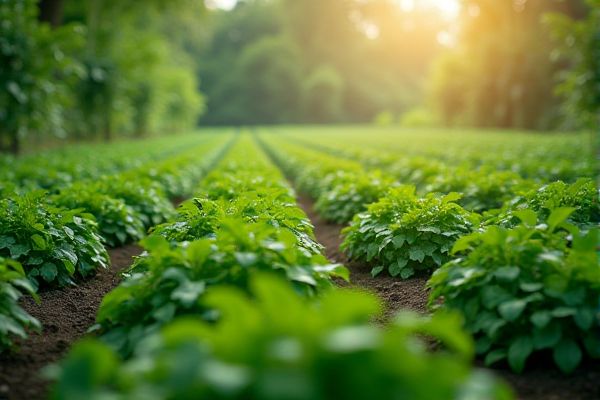
AI enhances organic farming by optimizing crop management through data analysis and decision-making support. Automated systems monitor soil conditions, pest activity, and weather patterns, ensuring timely interventions that promote plant health. Machine learning algorithms enable farmers to predict yields and identify the most effective organic practices tailored to their specific environments. Moreover, AI-driven tools streamline supply chain processes, reducing waste and improving food distribution efficiency.
AI usage in organic farming
Precision Agriculture
AI can enhance organic farming by analyzing soil health and predicting crop yields. For example, implementing precision agriculture techniques allows farmers to optimize resource usage, potentially increasing productivity. The integration of machine learning can improve pest management strategies, reducing the reliance on chemical inputs. These advancements may lead to a more sustainable agricultural ecosystem while maintaining the principles of organic farming.
Crop Health Monitoring
AI can enhance organic farming by providing precise crop health monitoring through data analysis and sensor technology. This approach can identify potential disease outbreaks or nutrient deficiencies early, allowing farmers to take proactive measures. By utilizing platforms like CropX, farmers can optimize irrigation and nutrient application, maximizing yields while maintaining organic standards. The integration of AI in these processes may significantly increase efficiency and crop quality.
Pest and Disease Detection
AI techniques can enhance pest and disease detection in organic farming by analyzing data from sensors and images. For example, machine learning algorithms can identify patterns in crop health, enabling early intervention against pests like aphids. This technology increases the likelihood of maintaining a healthy crop yield while adhering to organic standards. Farmers could experience reduced chemical use, resulting in possible cost savings and environmental benefits.
Soil Quality Analysis
AI can greatly enhance soil quality analysis in organic farming by providing accurate and real-time data on soil health. By utilizing machine learning algorithms, farmers can predict potential nutrient deficiencies and tailor their practices accordingly. The integration of AI tools, such as drone technology, allows for comprehensive monitoring of soil conditions over large areas. This approach not only boosts crop yields but also reduces the environmental impact of farming practices.
Yield Prediction
AI can enhance yield prediction in organic farming by analyzing data from various sources such as soil sensors and weather patterns. For example, machine learning algorithms can process historical yield data from institutions like the Rodale Institute to forecast future production levels. This technology allows farmers to make informed decisions, optimizing resource use and potentially increasing profitability. The integration of AI offers a chance for more precise farming practices, ultimately benefiting sustainability efforts.
Smart Irrigation Systems
AI can optimize various processes in organic farming, enhancing yield potential by analyzing soil health and crop requirements. Smart irrigation systems equipped with AI can adjust water usage based on real-time data, promoting sustainability. The integration of technologies like drones for monitoring crop conditions may further improve efficiency in pest management. This combination of AI and advanced tools offers a significant chance to increase productivity while adhering to organic standards.
Autonomous Machinery
AI usage in organic farming enhances crop management and pest control, leading to more efficient resource use. Autonomous machinery, like robotic harvesters, can optimize labor costs while minimizing soil disturbance. Data-driven insights from AI can help farmers make informed decisions about planting and irrigation schedules. This technology may increase yield potential and promote sustainable practices within the agricultural sector.
Data-driven Decision Making
AI can enhance organic farming by analyzing soil health, crop requirements, and environmental conditions. For instance, platforms like IBM Watson can provide insights that help farmers make informed decisions about resource allocation. Such data-driven approaches can lead to improved yields and sustainable practices. The possibility of integrating these technologies could transform traditional farming methods into more efficient operations.
Resource Optimization
AI can enhance resource optimization in organic farming by analyzing weather patterns, soil health, and crop performance to increase yield while reducing waste. For instance, precision agriculture technologies enabled by AI can provide farmers with tailored recommendations for irrigation and fertilizer application. This not only conserves water but also minimizes the use of chemical inputs, aligning with organic farming principles. The potential for improved productivity and sustainability presents significant advantages for farmers and agricultural institutions like the Organic Trade Association.
Environmental Impact Assessment
AI can enhance organic farming practices by optimizing resource use, leading to potentially higher yields. By analyzing data on soil quality and crop health, AI tools can help farmers make informed decisions, improving sustainability. Environmental Impact Assessments can be more efficient with AI, providing quicker insights into ecological effects. For instance, institutions like the Environmental Protection Agency can utilize AI models to predict the impacts of farming practices on biodiversity.
 techknowy.com
techknowy.com